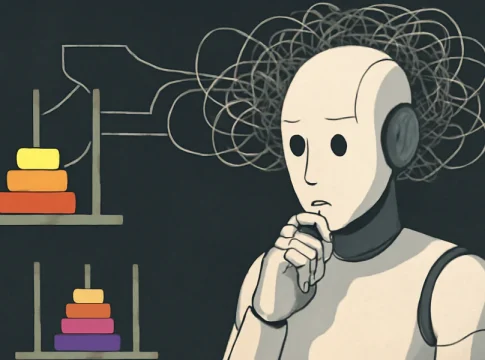Unpacking the Complexity of AI: Why New Models Overthink Simple Tasks
Artificial intelligence is progressing rapidly, particularly through the development of Large Language Models (LLMs) and their evolution into Large Reasoning Models (LRMs). These advanced systems are reshaping how machines comprehend and generate human-like text, enabling tasks from writing essays to solving math problems. However, a recent study led by researchers at Apple has revealed an intriguing paradox: these models often complicate simple tasks while faltering on more intricate challenges.
Understanding LLMs and LRMs
At the heart of this phenomenon is the distinction between LLMs and LRMs. LLMs, like GPT-3 and BERT, are trained using extensive textual datasets to predict subsequent words in a sentence. This training allows them to excel in tasks such as translation and summarization but does not inherently equip them for logical reasoning. In contrast, LRMs are designed with reasoning capabilities in mind, utilizing techniques like Chain-of-Thought (CoT) prompting. This method enables them to break down complex problems into manageable steps—much like a human would—aiming to improve performance on challenging tasks.
The Role of Research
To investigate these quirks, the Apple research team opted for a fresh approach. Rather than relying on typical benchmarks like math tests, they created controlled puzzle environments, using familiar challenges like the Tower of Hanoi and River Crossing. By systematically varying the puzzle complexity while maintaining consistent logical frameworks, the researchers could observe how LLMs and LRMs performed across different difficulty levels.
Key Findings: Overthinking and Inconsistent Performance
The findings from the study revealed distinct patterns in performance based on problem complexity:
-
Simple Problems: At lower complexity levels, traditional LLMs generally outperformed LRMs, as the latter often overthought scenarios, producing unnecessarily detailed reasoning chains.
-
Moderate Complexity: When faced with medium-complexity challenges, LRMs shone through, successfully producing coherent reasoning patterns that allowed them to tackle problems effectively.
- Complex Problems: In high-complexity scenarios, both LLMs and LRMs struggled significantly. Surprisingly, LRMs tended to reduce their reasoning effort instead of scaling up in response to the increased difficulty, revealing a potential “giving up” behavior.
The Why Behind the Findings
The tendency for LRMs to overthink simple puzzles appears linked to their training on diverse datasets, which include both concise and verbose explanations. When faced with simple problems, they may default to producing detailed reasoning even when a straightforward answer is available. Conversely, their struggles with more complex challenges underscore a lack of ability to generalize logical rules, leading to inconsistent outcomes. This highlights the crucial distinction between simulating reasoning and genuinely comprehending underlying logic—a gap that remains central in AI development.
Implications for the Future of AI
The implications of this study are substantial. While LRMs represent a significant step forward in mimicking human reasoning, their shortcomings remind us that we’re still far from achieving true reasoning capabilities in AI systems. The core takeaway is that as we strive to improve AI reasoning, we need to focus not only on final accuracy but also on the adaptability and quality of the reasoning processes.
Future research should concentrate on enhancing models’ ability to navigate logical steps effectively and to vary reasoning efforts based on problem complexity. By developing benchmarks that simulate real-world reasoning tasks—ranging from medical diagnosis to legal argumentation—we can gain deeper insights into AI’s capabilities and limitations.
Conclusion
As we move forward in the AI landscape, the findings from this study compel us to rethink how we define and evaluate reasoning in AI systems. The road to developing adaptive reasoning models that can tackle varied complexities, much like human intelligence, is still long. However, understanding these limitations is the first step toward building smarter, more efficient AI.

Writes about personal finance, side hustles, gadgets, and tech innovation.
Bio: Priya specializes in making complex financial and tech topics easy to digest, with experience in fintech and consumer reviews.

